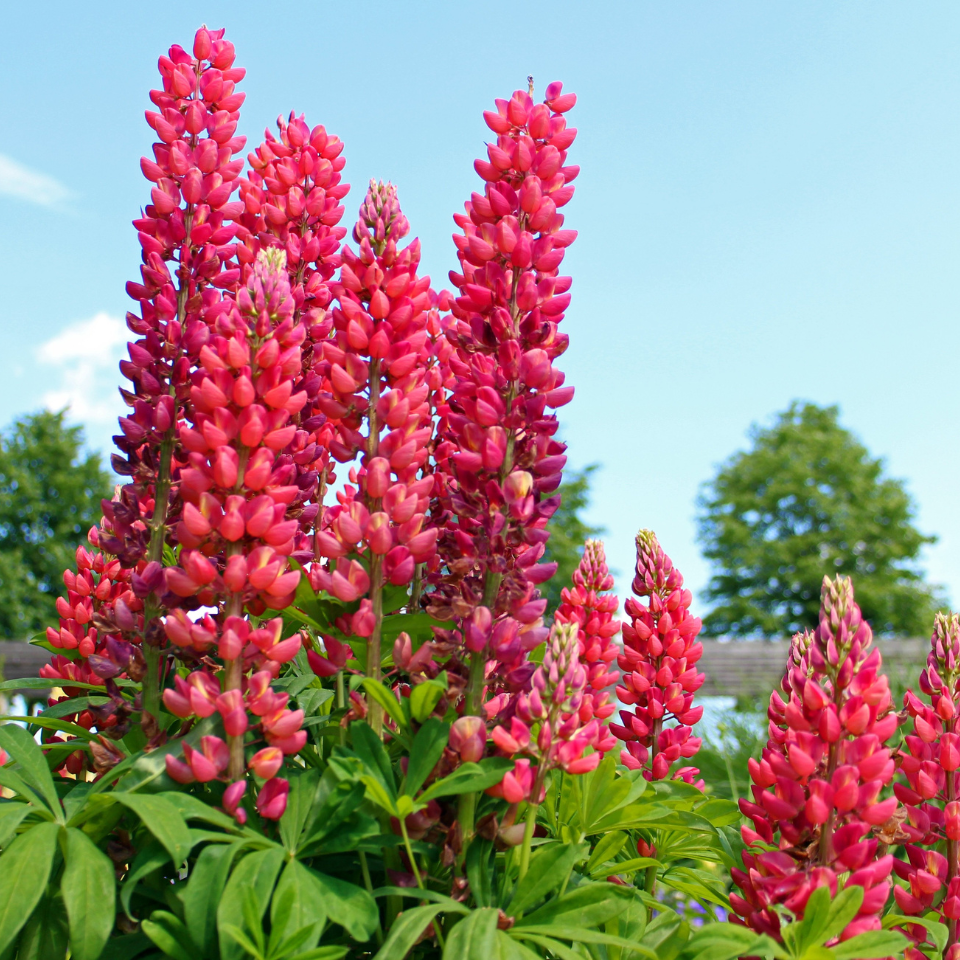Lupine (Lupinus spp.) Mixed Colours
General Description
Lupines (Lupinus spp.) are vibrant flowering plants known for their tall, colorful spikes and their ability to thrive in diverse conditions. Native to the Americas, Mediterranean regions, and parts of Africa, lupines have been cultivated for centuries for their ornamental beauty, nitrogen-fixing abilities, and adaptability. This mixed colors variety offers an array of hues, including pink, purple, blue, white, and yellow, making it a favorite for gardeners seeking to add vertical interest and vibrant colors to their landscapes.
Plant Characteristics
Lupines grow to a height of 60–120 cm, depending on the variety. The plants form a rosette of palm-shaped green leaves, with tall, upright spikes of densely packed pea-like flowers. Blooming from late spring to mid-summer, these flowers not only add beauty but also attract bees, butterflies, and hummingbirds. The plant’s deep roots help improve soil structure and prevent erosion, making it an excellent choice for eco-friendly gardening.
Taste and Benefits
While the seeds of some lupine species are used as a food source in Mediterranean cuisines after proper preparation to remove alkaloids, this variety is primarily cultivated for ornamental purposes. Lupines are known for their ability to enrich the soil by fixing nitrogen, benefiting neighboring plants and improving overall garden fertility.
Cultivation Recommendations
Lupines thrive in full sun and well-drained, slightly acidic to neutral soils. Seeds should be sown in early spring or autumn, directly in the garden or started indoors. To improve germination, scarify the seeds by lightly nicking the seed coat or soaking them in warm water for 12–24 hours before planting. Plant the seeds 1–2 cm deep, spacing them about 30–50 cm apart. Water moderately until established and ensure they are not overwatered, as lupines prefer dry conditions once mature. Deadheading spent blooms encourages a longer flowering period.
Uses and Benefits
Lupines are widely used in ornamental gardening, adding height, structure, and vibrant colors to flower beds, borders, and wildflower meadows. Their ability to fix nitrogen improves soil health, making them a valuable companion plant for vegetables and other garden species. Additionally, their nectar-rich flowers support pollinators, contributing to a healthy garden ecosystem.
Packaging
The seeds are carefully selected and packed in moisture-resistant packaging to ensure high germination rates and long-term viability.
Shipping Information
Orders are processed within 1–2 days and shipped worldwide, including across India. Delivery typically takes 1–2 weeks, depending on the destination.
Grow these vibrant and eco-friendly flowering plants with premium seeds from Deodar Seeds.
General Description
Lupines (Lupinus spp.) are vibrant flowering plants known for their tall, colorful spikes and their ability to thrive in diverse conditions. Native to the Americas, Mediterranean regions, and parts of Africa, lupines have been cultivated for centuries for their ornamental beauty, nitrogen-fixing abilities, and adaptability. This mixed colors variety offers an array of hues, including pink, purple, blue, white, and yellow, making it a favorite for gardeners seeking to add vertical interest and vibrant colors to their landscapes.
Plant Characteristics
Lupines grow to a height of 60–120 cm, depending on the variety. The plants form a rosette of palm-shaped green leaves, with tall, upright spikes of densely packed pea-like flowers. Blooming from late spring to mid-summer, these flowers not only add beauty but also attract bees, butterflies, and hummingbirds. The plant’s deep roots help improve soil structure and prevent erosion, making it an excellent choice for eco-friendly gardening.
Taste and Benefits
While the seeds of some lupine species are used as a food source in Mediterranean cuisines after proper preparation to remove alkaloids, this variety is primarily cultivated for ornamental purposes. Lupines are known for their ability to enrich the soil by fixing nitrogen, benefiting neighboring plants and improving overall garden fertility.
Cultivation Recommendations
Lupines thrive in full sun and well-drained, slightly acidic to neutral soils. Seeds should be sown in early spring or autumn, directly in the garden or started indoors. To improve germination, scarify the seeds by lightly nicking the seed coat or soaking them in warm water for 12–24 hours before planting. Plant the seeds 1–2 cm deep, spacing them about 30–50 cm apart. Water moderately until established and ensure they are not overwatered, as lupines prefer dry conditions once mature. Deadheading spent blooms encourages a longer flowering period.
Uses and Benefits
Lupines are widely used in ornamental gardening, adding height, structure, and vibrant colors to flower beds, borders, and wildflower meadows. Their ability to fix nitrogen improves soil health, making them a valuable companion plant for vegetables and other garden species. Additionally, their nectar-rich flowers support pollinators, contributing to a healthy garden ecosystem.
Packaging
The seeds are carefully selected and packed in moisture-resistant packaging to ensure high germination rates and long-term viability.
Shipping Information
Orders are processed within 1–2 days and shipped worldwide, including across India. Delivery typically takes 1–2 weeks, depending on the destination.
Grow these vibrant and eco-friendly flowering plants with premium seeds from Deodar Seeds.
Lupine Cinenaria seeds mixed clolours - 50
- Brand: Deodar Seeds
- Product Code: FL29
- Availability: In Stock
₹342.00










